上海交大赵大海接受上视专访:印度新冠海啸式大暴发的解释与研判
上海交通大学国际与公共事务学院教授、博士生导师,上海交通大学-耶鲁大学卫生政策联合研究中心执行主任赵大海,自新冠肺炎疫情暴发以来,对于新冠疫情暴发、防控以及卫生政策第33次接受上海电视台专访,也是第87次接受央视、上视专访。2021年4月26日,赵大海做客上海电视台新闻综合频道演播室,在《夜线约见》节目,就印度新冠大暴发的原因、趋势等话题进行了解释和研判。现将有关访谈内容摘录如下。
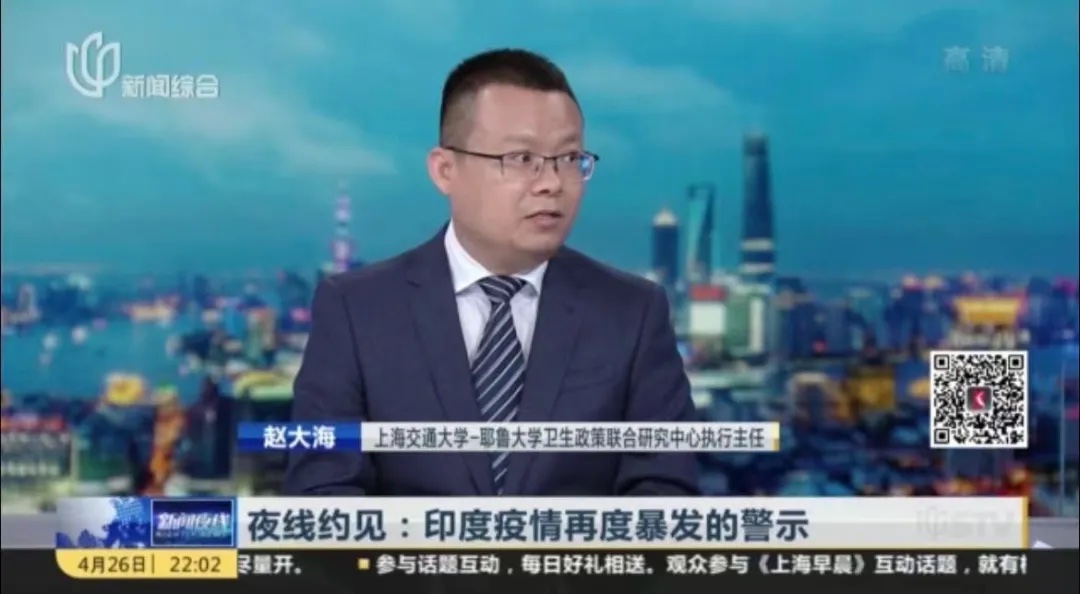
主持人:今天走进演播室参与讨论的是上海交通大学-耶鲁大学卫生政策联合研究中心执行主任赵大海。其实我们刚才片子里面也看到了,莫迪在一月份的时候已经宣布胜利,可以说那时候对印度来说是一个趋缓阶段,为什么会从那时候的趋缓到现在这样一个急剧的一个暴发,这中间到底发生了什么?是什么原因?
赵大海:应该讲有一个根本原因,还有两个直接原因。根本的原因就在于,包括刚才您提到的莫迪总理在今年一月份宣布一个局部的胜利,应该讲当时,每一天的新增病例还要超过1万例,在那个时候,印度疫情虽然有了一定的控制,但是远远没有到成功的时候。这也就是说,印度政府对于疫情的防控一直没有采取持续的、科学的、严格的防控措施,这是导致现在印度疫情防控出现失控的根本原因。另外两个直接原因,第一个是印度在过去一段时间正在过“大壶节”,根据官方统计数据,超过五千万人在短时间之内在恒河沿岸进行人群大聚集。另外一个直接的原因,随着在印度新冠疫苗的接种,印度政府和民众放松了警惕。
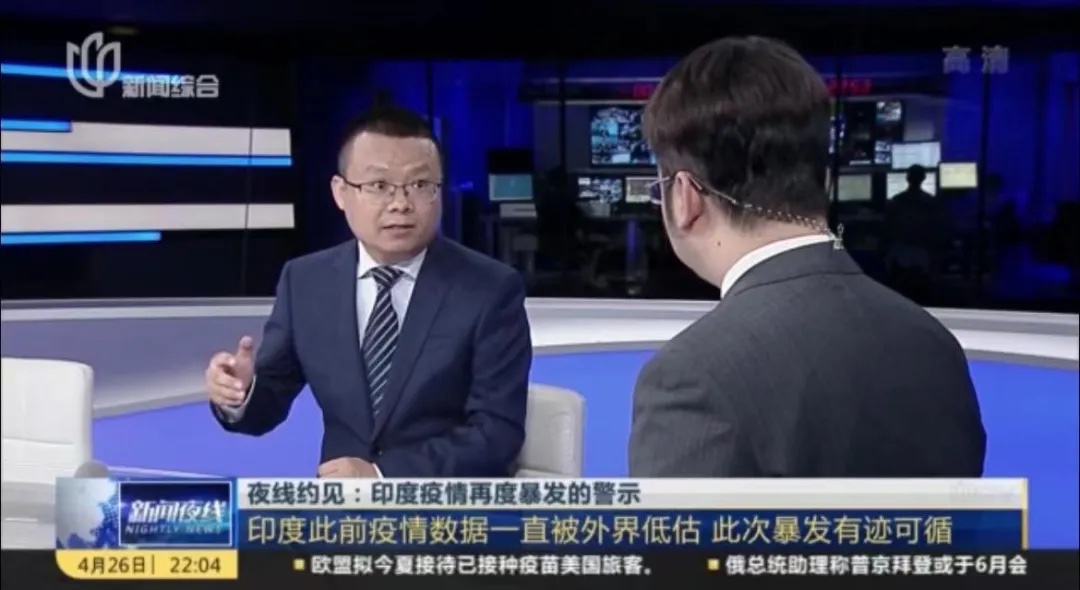
主持人:从这个角度来讲,可能是造成目前这样一个情况的一个潜在的原因。另外,其实我们也非常关注这两天的数据。有一个数据显示死亡人数,这个数字非常可怕,我们来看一下,约翰斯霍普金斯大学最新公布,就是4月25号,就是昨天,印度新增死亡病例是2812例,可以说是再创新高,为什么会有这么高的一个数字?究竟是什么原因?
赵大海:一方面,印度的新冠死亡人数在国际上一直认为原先是被低估了,这个数据没有进行一个详实的统计;另外,随着最近一段时间,印度新冠疫情的急剧递增,随着确诊病例数的增加,自然而然,死亡人数也一定会同比例的增加。还有一个可能更为重要的原因,就是因为随着印度新冠确诊病例的急剧增加,对于印度医疗卫生系统而言,现在濒临崩溃,出现了医疗防护物资等各方面的比较严重的紧缺,因此,患者病死率肯定会有一个比较大的提高。
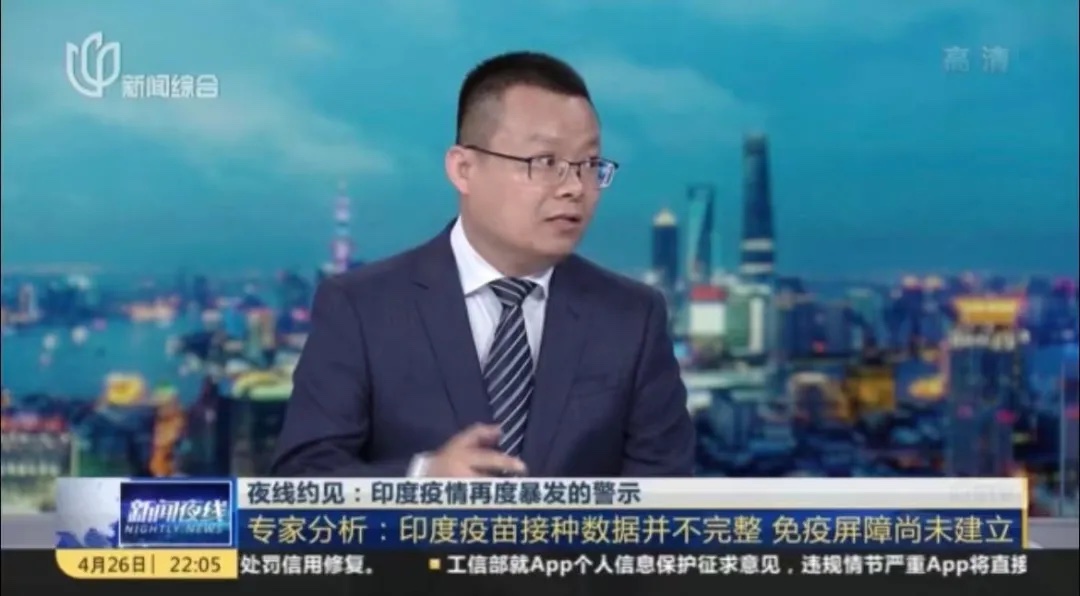
主持人:另外,我们也看到有一些数据,比如说印度的疫苗接种的数据,现在全球的疫苗接种量不低,我们可以这样去讲,那么有一种说法就说了,是不是说这次病毒变异,那么它对于这样的疫苗有一些抵抗性,无法去有效遏制这样的病毒的传播,对于这点,您怎么看?
赵大海:首先,我认为这个说法应该是不科学的。就是说现在印度的疫苗接种剂量是超过了1.3亿剂,而且印度所用的疫苗都是要打两针的,因此,现在的接种人数,因为印度的人口是超过13亿人口,远远没有在印度建立起疫苗的保护屏障。因此,印度现在新冠疫情的再次暴发跟新冠疫苗的接种并没有直接的关系。另外还有一个依据,现在印度政府并没有统计,在印度已经接种新冠疫苗的人群当中到底有多少是感染者,因此,我们现在还没有办法得出刚才的这个结论。
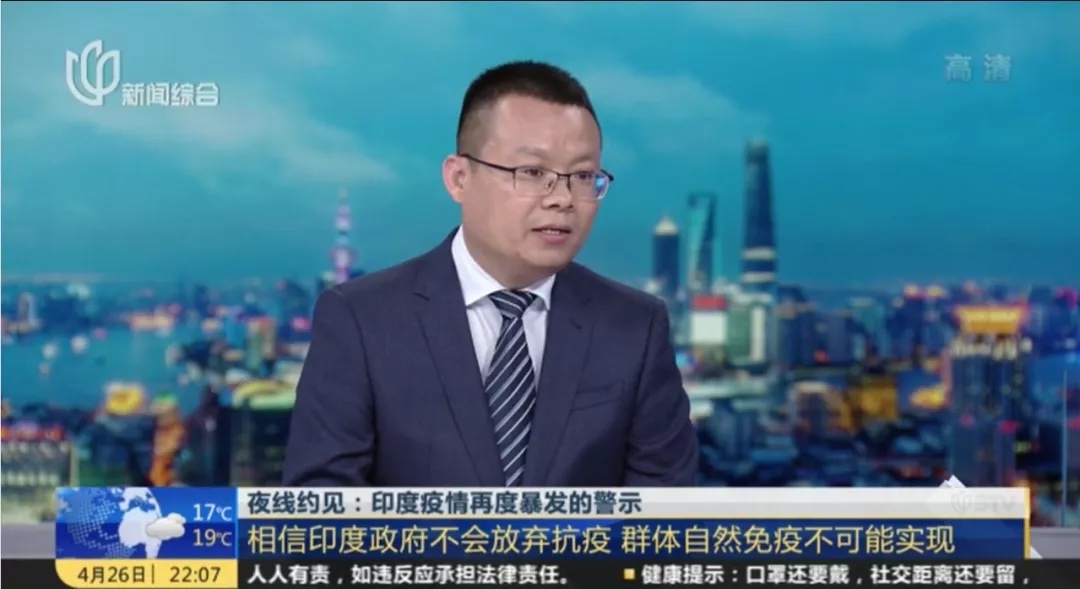
主持人:另外,我们也说到了疫苗这个话题,我们也知道印度可以说是世界的疫苗工厂,包括有大量的疫苗生产企业,那么像现在,我们也从一些报道中看到,印度现在同样面临着疫苗短缺这么一种情况,那为什么这样可以说是世界的疫苗工厂的国家现在会面临这样的情况呢?
赵大海:应该从两个方面来解释。刚才我们也提到了,印度的疫苗的生产应该讲总量上不算低,现在到目前为止,美国是刚刚超过2亿剂;中国是接近1.9亿剂,而印度是超过了1.3亿剂,印度是全世界排第三,应该是不低的。另外一个方面,虽然印度是疫苗的生产大国,但是印度从来不是疫苗的研发大国。印度的疫苗,特别是新冠疫苗,在设备、技术、原材料方面,很大程度上是依赖于从欧美国家的进口。随着原先特朗普政府,现在拜登政府,对于疫苗生产原料很大程度的限制出口,对于印度的新冠疫苗的生产,包括现在的接种而言,有很大的影响。
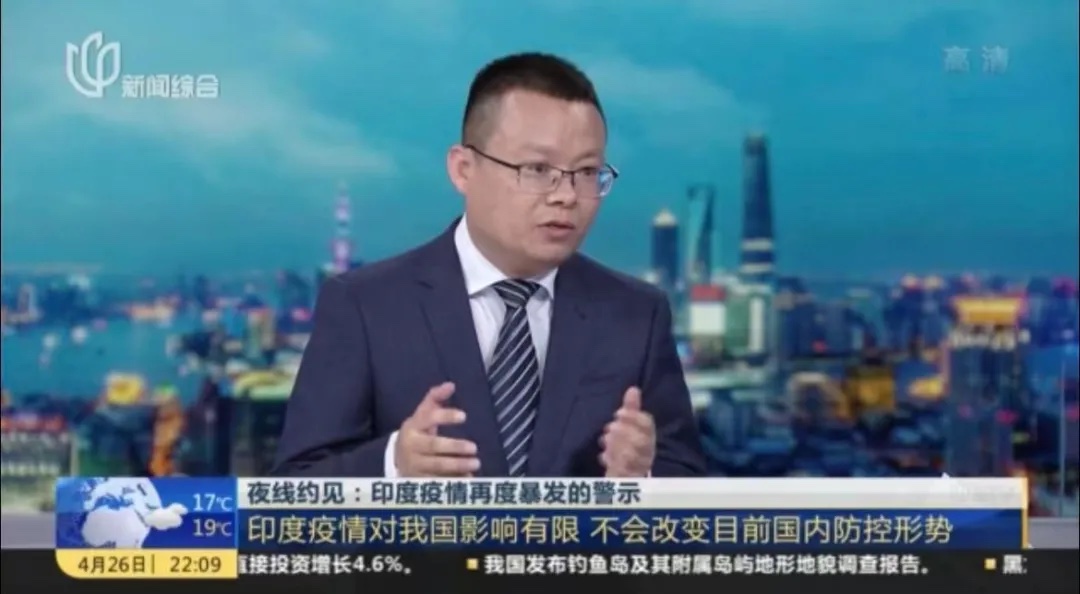
主持人:我们也提到了确实是外面的一些情况,一些限制,对它的生产造成了影响,因为现在还一种说法说,既然现在大流行了,那么是不是可以通过这种流行之后的群体免疫的情况,来缓解这一波的疫情?您觉得这个说法正确吗?
赵大海:首先,这个说法肯定是完全不正确的。对于人群的自然免疫疗法,首先在理论上都很难实现。现在我们普遍的观点,通过人群免疫的话,是不科学的,也是不符合人类伦理的基本准则的。我们更希望的还是,印度政府采取严格的防控措施,采取真正的抗击新冠疫情的态度对待这一波非常大幅度的新冠疫情的暴发。对于群体免疫而言,其实就是放弃疫情抵抗的意思,因此,我认为这个方式是不可取的,也是不符合人类伦理的。
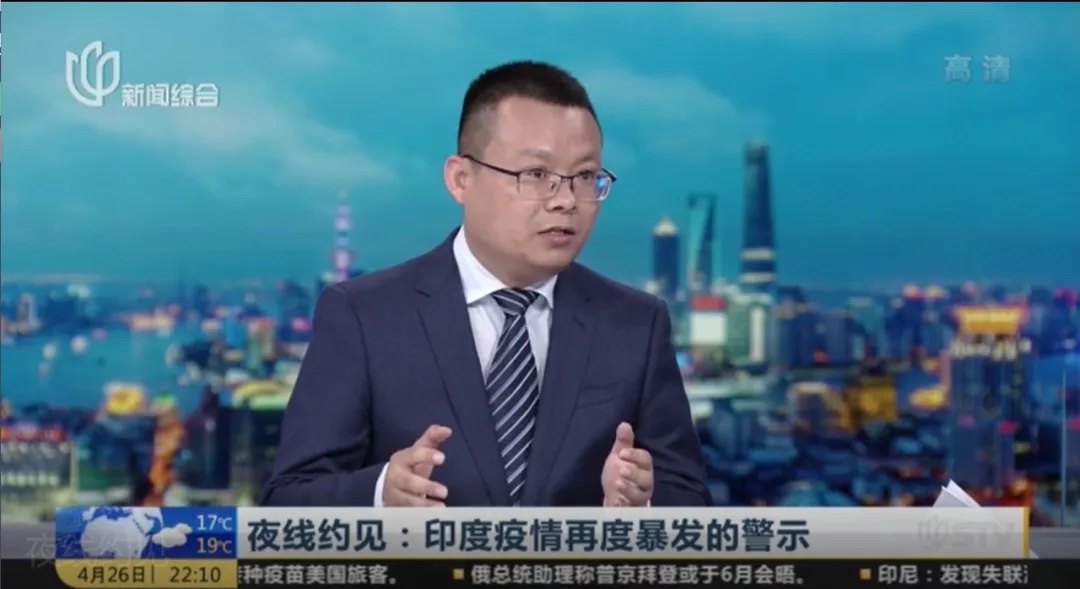
主持人:我们也非常关注印度的疫情对于我们自身的这样的影响,毕竟我们互相是接壤的国家,而且根据印度官方的预测,最高峰可能会在五月中旬达到日增50万这样的一个数字,这对于我们本身来说会不会造成什么影响?
赵大海:印度这一波海啸式的新冠疫情的大暴发,对于我们中国一定会有一些影响,但是对于中国的新冠疫情防控形势的影响应该是非常有限的。最主要的原因是自新冠疫情大流行以来,中国对于境外的人员和境外的物资都采取了非常严格的疫情防控措施,比如说对于境外的人员一直采取集中隔离两周的这种方式;对于物资也采取非常严格的消杀。因此,印度的这波新冠疫情大暴发对于中国的影响是非常有限的。
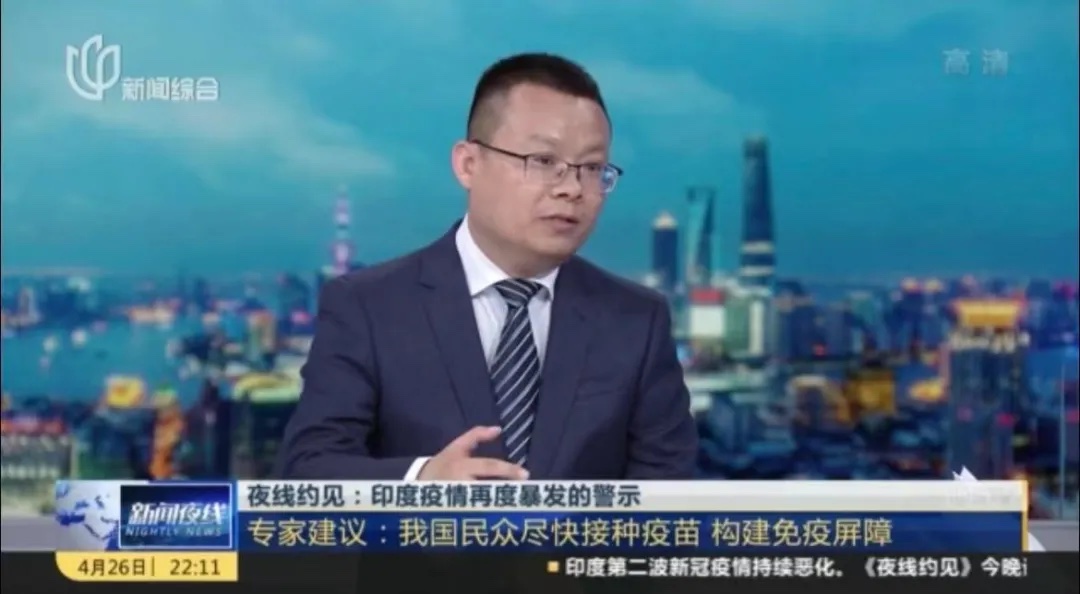
主持人:我们最近也关注到了全球的一些主要国家也纷纷表态了,包括像中国、新加坡,包括巴基斯坦,包括像今天美国也松口了,表示也要去支援印度,那么全球的支援会不会给印度的这波疫情带来缓和或者说控制它?
赵大海:世界各国现在表态,未来对于印度的帮助,肯定会对于印度新冠疫情的缓和起到积极作用。当然,印度新冠疫情形势的彻底扭转,最主要需要依赖于印度政府和印度公众本身。也就是说,印度政府必须要采取严格的防控措施,尽快大面积地加快新冠疫苗的接种,主要的工作还是有赖于印度政府。
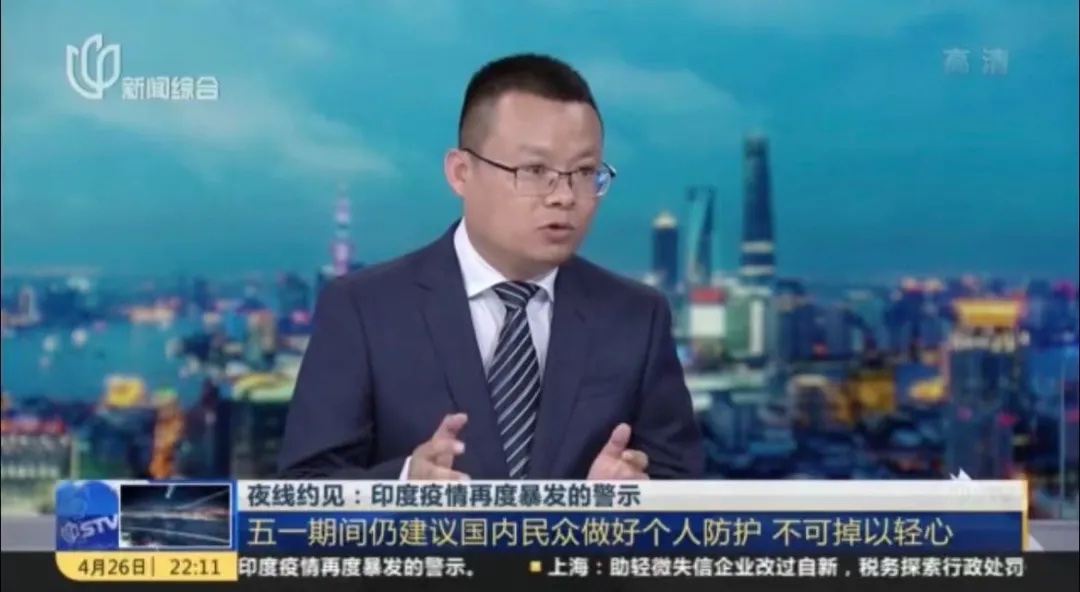
主持人:也就是说自己来去把自身的问题解决了,去做好这件事情。我们也非常关注,如果从您的角度来看,印度这次的疫情暴发,有什么样的教训值得我们全球去吸取?
赵大海:世界任何国家,包括我们中国在内,我们需要吸取的一个教训,就是说新冠疫情一日没有从全球消失,那任何国家都不可以完全放松警惕。另外一个可能更为重要的教训就是说,比如说对于中国而言,我们一定要尽快地加快新冠疫苗的接种工作,尽快地通过新冠疫苗建立起免疫屏障,防止新冠疫情的再次暴发。对于我们即将开始的五一长假而言,那我们公众在出行的过程当中,还是不能完全放松警惕,要做好我们常规的新冠疫情的自我防护措施。
主持人:非常感谢您今天参与我们的讨论!印度疫情失控留下的教训,也是对于全世界的提醒,新冠疫情是全人类共同的敌人,应该要团结一心,共同抗议,才能让世界真正走出阴霾。
供稿:国务学院
日期:2021年4月27日
Dahai ZHAO’s Exclusive Interview with ShanghaiTV: Analysis and interpretation of India's Covid tsunami
Dahai Zhao, a doctoral supervisor at the School of International and Public Affairs of Shanghai Jiao Tong University and Executive Director of Shanghai Jiao Tong University-Yale University Joint Research Center for Health Policy, has been interviewed by ShanghaiTV for the 33st time (the 87st time by CGTN / ShanghaiTV) since the COVID-19 pandemic. On April 26, 2021, Zhao commented on causes and trends of the COVID-19 in India on “Night Appointment” of Shanghai TV.
Anchor: Actually, as we saw in the video, Modi declared victory in January. It could be said that there was a slowdown for India at that time. Why is there such a sharp outbreak now, and what happened in between? What's the reason?
ZHAO: I should say there is a root cause, and there are two direct causes. The fundamental reason is that Prime Minister Modi announced a partial victory in January this year. At that time, more than 10,000 new cases were being recorded every day. At that time, the epidemic in India had been brought under control to some extent, but it was far from being successful. That is to say, the Indian government has not taken sustained, scientific and strict measures to prevent and control the epidemic, which is the fundamental reason why the epidemic in India is out of control. Two other immediate causes are the Kumbh Mela festival in India, where, according to official statistics, more than 50 million people have gathered along the Ganges River in a short time. Another immediate reason is that, following the introduction of the vaccine in India, the Indian government and people have relaxed their vigilance.
Anchor: From this point of view, may be a potential cause of the present situation. In addition, we are also very concerned about these two days of data. According to the latest report from Johns Hopkins University, on April 25th, just yesterday, the number of new deaths in India reached a new high of 2,812. Why is there such a high number? What is the reason?
ZHAO: On the one hand, India's death toll has long been considered an international underestimate, and the figures have not been properly counted. In addition, with the rapid increase in the number of COVID-19 cases in India in recent times, and with the increase in the number of confirmed cases, the death toll must naturally increase proportionately as well. Another, perhaps more important, reason is that with the rapid increase in the number of confirmed cases of COVID-19 in India, the health care system in India is now on the verge of collapse, and there is a serious shortage of medical protection materials and other aspects. Therefore, the fatality rate of patients is bound to increase significantly.
Anchor: In addition, we also see some data, for example, on vaccination in India. What do you think about the fact that this mutation is somewhat resistant to such a vaccine and cannot effectively contain the spread of such a virus?
ZHAO: First of all, I think this statement should be unscientific. That's more than 130 million doses of vaccine in India. The vaccines used in India require two doses, so the number of vaccinated people in India is more than 1.3 billion, far from having a protective barrier in place. Therefore, the current re-outbreak of COVID-19 in India is not directly related to COVID-19 vaccination. Another reason is that the Indian government does not currently have statistics on how many people in India who have been vaccinated against COVID-19 have been infected, so it is not possible to draw this conclusion.
Anchor: India is arguably the vaccine factory of the world, including a large number of vaccine manufacturers. India is also facing a vaccine shortage, so why is this happening in a country that is the vaccine factory of the world?
ZHAO: It should be explained in two ways. India's vaccine production should not be low in total. Now so far, the United States is just over 200 million doses; China had nearly 190 million doses, while India had more than 130 million, making it the third largest country in the world. On the other hand, although India is a big producer of vaccines, it has never been a big developer of vaccines. India's vaccines, especially COVID-19, are largely dependent on imports from the US and Europe in terms of equipment, technology and raw materials. With the previous Trump administration, and now the Biden administration, restricting the export of vaccine production materials to a significant extent, this has had a significant impact on the production of COVID-19 vaccine in India, including the current inoculation.
Anchor: We also mentioned that there were some conditions outside, some restrictions, that had an impact on its production. Could this wave of disease be mitigated by herd immunity after the epidemic?
ZHAO: First of all, it must be completely untrue. Natural immunotherapy for the population, first of all, is difficult to achieve in theory. Now our general view, through human immunity, is not scientific, and does not conform to the basic principles of human ethics. What we hope more is that the Indian government will take strict control measures and adopt a genuine attitude towards the COVID-19 outbreak, which is a very large wave. For herd immunity, in fact, it means to give up the resistance to the epidemic. Therefore, I think this approach is not desirable and not in line with human ethics.
Anchor: We are also very concerned about the impact of the epidemic in India on ourselves. After all, we are bordering each other. And according to the official forecast of India, it may reach a figure of 500,000 a day by the middle of May. Will this have any effect on us?
ZHAO: This wave of COVID-19 in India will certainly have some impact on China, but the impact on China's situation should be very limited. The most important reason is that since the outbreak, China has taken very strict measures to prevent and control the COVID-19 epidemic in people and materials from abroad. For example, China has kept people from abroad under quarantine for two weeks. Very strict elimination and killing of materials were also adopted. Therefore, the impact of the COVID-19 outbreak in India on China is very limited.
Anchor: Recently, we have noticed that some major countries in the world have also took statements, such as China, Singapore, Pakistan, and including today when the United States is dropping its lip and saying it's going to help India too. So will global support help contain the outbreak in India?
ZHAO: The help for India will definitely play a positive role in mitigating the COVID-19 in India. Of course, the complete reversal of the situation in India depends most on the Indian government and the Indian public itself. In other words, the Indian government must take strict control measures to speed up the mass vaccination of the COVID-19 vaccine as soon as possible. The main task is still to be done by the Indian government.
Anchor: If you look at it from your perspective, what are the lessons for the world to learn from this outbreak in India?
ZHAO: One lesson that any country in the world, including China, needs to learn is that no country can completely relax its vigilance. Another perhaps more important lesson is that, for China, for example, immune barriers should be established through the vaccine as soon as possible to prevent the re-outbreak. As for the upcoming May Day holiday, the public should not completely relax their vigilance during travel. They should do a good job in our regular self-protection measures against COVID-19.
Contributor: SIPA, SJTU
Date: April 27, 2021

